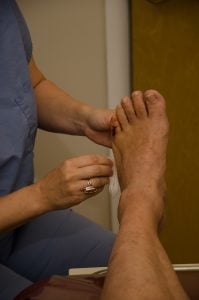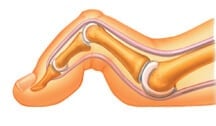Arthritis

Arthritis
If you are experiencing pain, swelling and/or stiffness in your toes, you may be suffering from a condition known as arthritis. Here, we will look at the possible forms that arthritis may take, how it can affect your day-to-day routine, and how you can combat the symptoms and free yourself from the agony it can bring.
Orthopace treatment of Osteoarthritis
The OrthoPACE device is effective in addressing a variety of medical conditions, including bone conditions. Shock waves have been shown to stimulate osteogenesis and treat painful bone damage adjacent to soft tissue. Some of the treatable medical conditions include:
- Achilles tendonitis (achillodynia)
- acute, delayed-union or non-union extremity fracture
- calcified shoulder (tendinosis calcarea)
- fasciitis plantaris (including a heel spur)
- hip bursitis (bursitis trochanterica calcarea)
- jumper’s knee (patellar tip syndrome or patellar tendonitis)
- osteoarthritis
- shoulder tendinosis (both with or without calcification)
- tennis or golfers elbow (epicondylitis)
What Kinds of Results Should I Expect?
Studies have demonstrated that ESWT can be effective after just one treatment. Some patients report that their pain gets better immediately after undergoing a PACE procedure. It can, however, take two to three weeks for others to notice a significant reduction in pain. If one treatment does not appear to be adequate, then a second treatment can be considered after 5 weeks.
Arthritis Symptoms
Common symptoms of arthritis that affect the toes include:
- Pain: While you may experience pain in the toes when you are active, pain may present even when the joints are relaxing.
- Stiffness and/or loss of function: Arthritis can on occasion cause limited movement in the affected areas. In particular, if affected, the big toe may be unable to fully bend upwards, which may cause pain when walking. Furthermore, if severe enough, the afflicted joints may be unable to move at all, and depending on the severity, walking on flat surfaces may be compromised.
- Swelling and inflammation: Swelling and inflammation: You may experience these symptoms in your toes and the joints associated with walking.
- Formation of a bump: Bumps may be present: Almost like a bunion or callus, you may develop bumps as the joints rub together.
Symptoms of arthritis in the toes:
When coping with arthritis, you may find yourself altering how you walk, which can cause secondary pains in areas of the foot that aren’t used to compensating for the other areas that should be working properly. This kind of alteration to your gait can have long lasting side effects.
- Muscle Aches
Hammertoe from arthritis - Anemia
- Fever
- Irregular toe formations, such as a clawed toe or a hammertoe
- Irregularities in the toenail, which include but are not limited to differing thickness, strength, or growth
- Experiencing pain in other areas on the foot
Arthritis Types
Osteoarthritis
Osteoarthritis is a type of arthritis that affects the soft tissues in between your joints called cartilage that helps smooth joint movement and reduce impact damage to the bones.
There are several unique types of arthritis that can present and cause issues in the toes. Included are:
Osteoarthritis (OA) causes the cartilage between the joints to deteriorate, and is the most common presentation of arthritis in the toes. When the cartilage fails to prevent the bones in the joints from rubbing against each other, those afflicted will experience pain and discomfort on or around the areas afflicted.
You may hear from your orthopedic specialist the term “hallux rigidus” when referring to OA as it occurs in the toe. This simply means that the big toe (hallux) is stiff (rigidus)
OA generally presents at the bottom joint of the big toe. Your specialist may refer to this area as the metatarsophalangeal joint, but it’s easier just to refer to it as the MTP joint.
Rheumatoid Arthritis
Also called : RA, Inflammatory Joint Disease, Seropositive Arthritis
What is rheumatoid arthritis?
Rheumatoid arthritis (RA) – one of the most common forms of inflammatory arthropathies. About ninety percent of patients with RA have or will have foot symptoms and problems. It usually affects many of the smaller joints ( like toes and metatarsals) in the foot at the same time, and tendons around the ankle.
How does weather or climate affect arthritis symptoms?
The impact of weather or climate on arthritis symptoms is a subject of ongoing research, and individual responses can vary. However, some people with arthritis report that changes in weather conditions may influence the severity of their symptoms. Here are some ways in which weather or climate might affect arthritis:
- Temperature Changes: Fluctuations in temperature, especially rapid drops or extreme cold, can be associated with increased joint pain and stiffness for some individuals with arthritis.
- Barometric Pressure: Changes in barometric pressure, which often occur with weather changes, might influence joint pain. Some individuals report increased pain when pressure drops before storms.
Can arthritis be hereditary, and how does genetics influence its development?
Yes, there is a genetic component to arthritis, and certain types of arthritis can have a hereditary predisposition. Here’s how genetics can influence the development of arthritis:
- Genetic Factors: Specific genes have been associated with an increased susceptibility to certain types of arthritis, such as rheumatoid arthritis (RA) and ankylosing spondylitis (AS). These genes contribute to the autoimmune and inflammatory processes involved in arthritis.
- Family History: Individuals with a family history of arthritis, particularly first-degree relatives (parents, siblings), may have a higher risk of developing arthritis themselves. This suggests a hereditary component to the condition.
- HLA Genes: The Human Leukocyte Antigen (HLA) genes are a group of genes that play a crucial role in the immune system. Certain variations in HLA genes are linked to an increased risk of developing specific types of arthritis, including RA.
- Polygenic Influence: While specific genes contribute to arthritis susceptibility, most forms of arthritis are polygenic, meaning they result from the interplay of multiple genetic factors. Environmental factors also play a role in triggering the expression of these genes.
home



